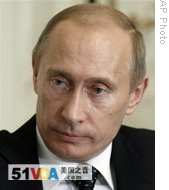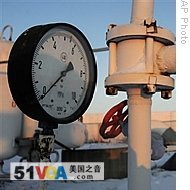Moscow
07 January 2009
 |
| Vladimir Putin |
Prime Minister Putin's go-ahead to stop gas shipments to Ukraine was based on a recommendation from Gazprom chairman Alexei Miller.
Mr. Putin tells Miller that he agrees with his proposal, but notes the cutoff should be carried out as publicly as possible in the presence of international observers.
Responding to questions from the prime minister, Miller said Gazprom has documented evidence that Ukraine caused the European shutdown.
But there are discrepancies in the timeline. Ukrainian officials reported Russia ceased delivery hours before the Miller-Putin meeting. Kyiv says it was this stoppage that forced Ukraine to close the pipelines that supply Europe.
Throughout the day Russian officials also insisted they had only withheld 21 million cubic meters, the amount of gas they allege Ukraine had stolen from Russia since the previous day.
The spokesman for Ukraine's Naftohaz gas company, Valentyn Zemliansky, told VOA the country's pipeline system was already being used to avoid shortfalls in eastern Ukraine.
Zemliansky says the Ukrainian system is not empty, because it is working in reverse, which means gas is being pumped out of underground storage tanks in western Ukraine and is being shipped to consumers in the eastern part of the country.
 |
| A gas pressure gauge is seen at a snow-covered transit point on the main pipeline from Russia in the village of Boyarka, near Kyiv, Ukraine, 06 Jan 2009 |
Gazprom's deputy chairman, Alexander Medvedev, warned about possible damage to the Ukrainian pipeline system. He spoke on Russia's Vesti-24 News Channel.
Medvedev says if gas does not flow through the system in cold weather, it could stop altogether because of hydraulic blockages. He says removing the blockages entails very serious operations, including cutting new taps in the pipe.
But Naftohaz gas company spokesman Zemliansky rejects Medvedev's statement as fear-mongering aimed at individuals who do not know pipeline technology. He told VOA the system will remain viable under any circumstances, even if the gas runs out completely.
Ukraine says it had been forced to use reserves to maintain the pressure needed to move gas to European consumers before the valves were closed.
Shortages are being felt as far downstream as France and Germany. Complete halts were reported in Bulgaria, Greece, Macedonia, Romania, Croatia, Serbia and Turkey.
Subzero temperatures throughout much of Europe is increasing demand for gas, and several governments have issued calls for conservation. While many countries have reserves or alternative sources, Bulgaria relies heavily on Russian gas and the country's president, Georgi Parvanov, says it could restart one of its nuclear reactors, which the European Union had previously deemed unsafe.
Russia and Ukraine are expected to hold face-to-face talks Thursday aimed at resolving the situation.
The European Union is calling for immediate resumption of all gas deliveries.
President Yushchenko expressed extreme concern over the situation in telegrams to Russian President Dmitri Medvedev and European Commission chief Jose Manuel Barroso. Prime Minister Putin has made his own appeals to Europe through Alexei Miller, ordering the Gazprom chairman to show Russia's gas contracts with Ukraine to EU officials in Brussels.
State Department Spokesman Sean McCormack issued a statement Tuesday calling the gas cutoffs unacceptable, and expressing regret over dispute. McCormack notes the episode underscores the critical need to diversify sources of natural gas, as well as other energy sources.